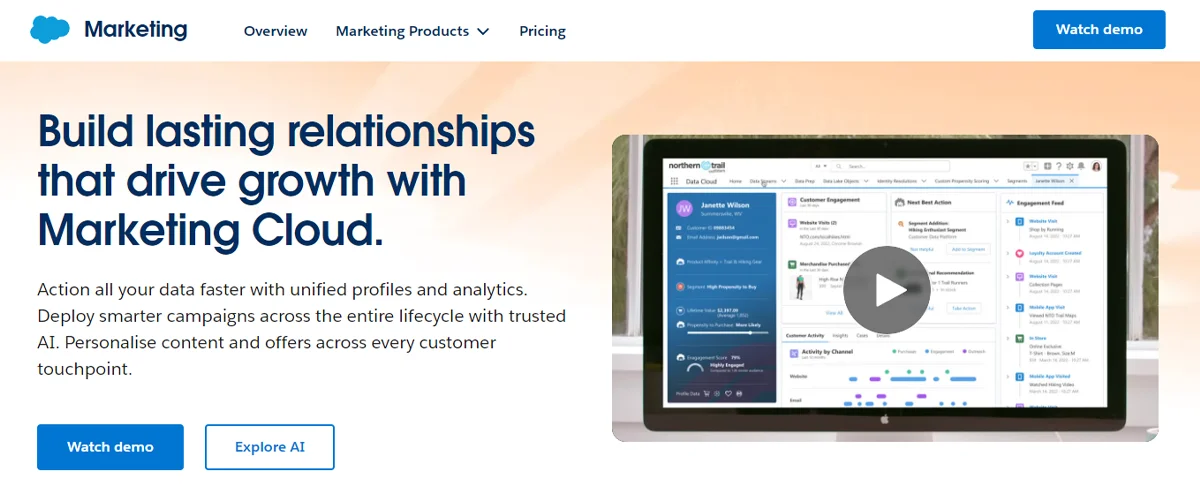Introduction
Automation is an essential part of every marketing activity today. Whether you’re posting social media posts, running Google Ads, email campaigns, or sending transactional emails, you cannot do it without automation, so marketing automation tools are a must-have in your martech tool stack.
With so many other businesses competing for the top spot in your niche, you just don’t have the time to sit down and do things manually. Besides, many of those tasks are tedious, and your energy would probably be best put into sales activities.
Marketing automation tools were once expensive, and only large companies and agencies with big budgets could afford them. We’re talking about tools like HubSpot and Active Campaign. But now, the market is saturated with low-cost marketing tools that offer some pretty premium features, making it possible for small businesses to automate. Think Brevo (formerly Sendinblue), Omnisend, and SendPulse, among others.
There are plenty of marketing automation tools in marketing, but we’ll discuss the top ten tools that will help take your marketing campaign to the next level.
But first, let’s find out what makes a great automation tool.
6 Qualities of A Great Marketing Automation Tool
Most tools claim to provide some level of automation, but the very best ones tick all these boxes regardless of their price:
- All-in-one: Businesses with varied needs will find a tool that can provide CRM, sales, marketing, and customer support capabilities under one umbrella to be much more cost-effective and less of a hustle.
- Plug and Play: Time is money in the online world, and you want a tool that’s as much “plug-and-play” as possible. Even if you have an entire marketing team, you probably don’t want them wasting days mastering software.
- Unlimited Automation: A great marketing tool should automate many marketing activities, including email, ads, social media posting and advertising, or SMS campaigns. Granted, some tools automate just one thing, and we still respect those if they do that one thing well.
- Integration: A great marketing automation tool should also integrate with your content management and other systems.
- Customer Support: Also, go for software with attentive customer support. A dedicated account manager or support team and a “done-for-you” service are also great additions, especially if you’re not great at working with software or want to spend as little time as possible from planning to execution.
- Data Analytics: Lastly, a great marketing tool should have data analytics. Most tools offer some reporting and analytics functionality, but the great ones allow customization.
List of the Top 10 Marketing Automation Tools
1. GetResponse

GetResponse is a great marketing automation tool thanks to its features like marketing automation, landing pages, and webinars.
Although almost anyone could benefit from using GetResponse, it’s especially ideal for businesses that want to combine email with other marketing efforts like paid ads and webinars.
GetResponse Features
- Multichannel engagement through email, sms, chat, popups, and web push notifications.
- Customer nurturing through custom events, trigger actions, and tailored messaging.
- Supports multiple integrations and can connect with Shopify and WooCommerce.
- Abandoned cart emails, product recommendations, and promo codes to drive more sales.
Pros:
- Robust AI tools for generating content and optimizing campaigns.
- Great multi-channel marketing options.
- Build for small businesses and enterprises.
Cons:
- Some advanced features are locked behind higher-tier plans.
- Beginners might need help with its feature-packed interface.
2. Brevo

Brevo is a low-cost and powerful tool that supports many automations including SMS, email, and WhatsApp messages. Its variety of email templates allows you to customize different types of emails in minutes without needing any design skills.
Brevo Features
- AI content generator helps Write copy faster.
- AI content generator helps Generate email subject lines that convert.
- Segmenting and sending customized sign-up forms, emails, or SMS messages.
- Retargeting and re-engaging customers with mobile and web push notifications.
- Marketing products through SMS campaigns.
Pros:
- Great tool for marketing workflows, CRM, and meeting scheduling.
- AI functionality.
Cons:
- Basic CRM tool.
- Only offers basic reporting on free and starter plans.
- You need to pay more to access basic features like landing pages.
3. SalesForce Pardot

If you’re running complex, multi-step campaigns that require close collaboration with your sales team, Pardot is the tool for you. It is Salesforce’s solution for B2B marketing automation – and quite a powerful one, too!
SalesForce Pardot Features
- It integrates natively with Salesforce, so you can track everything from lead generation to deal closure—in one place.
- Features like lead scoring, nurturing, and detailed ROI tracking make it easier to focus on high-value accounts.
- Lead scoring: Automatically prioritize leads based on how they interact with your content and campaigns.
- Email and campaign automation: Engage prospects where it matters most.
- Account-based marketing: Personalize campaigns to specific accounts.
Pros:
- Perfect integration with Salesforce CRM.
- Ideal for complex B2B sales cycles.
- Powerful lead scoring and nurturing capabilities.
Cons:
- It is expensive and requires a significant setup.
- It can be challenging for beginners or smaller teams to navigate.
4. HubSpot Marketing Hub

HubSpot is an all-in-one platform for businesses that need to manage their marketing and sales, customer service, and CRM—all from one place. Known for its ease of use and powerful automation tools, HubSpot is particularly popular among mid-sized and enterprise businesses.
HubSpot’s Marketing Hub’s Features
- Build personalized behavior-based workflows and also nurture leads through email drip campaigns.
- Use customer segmentation and automated lead scoring to build journeys and run targeted ads.
- Integrate with CRM and capture all the data you need to nurture leads throughout the customer journey.
- The platform also has advanced analytics, complete with customizable dashboards and reports.
Pros:
- All-in-one solution that scales with your business.
- Extensive CRM integration.
- Easy-to-use marketing automation tools.
Cons:
- High cost, so we recommend this tool for large businesses.
- The platform can feel overwhelming due to its many features.
5. Keap

Keap is a user-friendly CRM and marketing automation platform that simplifies your workflow by integrating customer management, email marketing, and even invoicing all in one place.
Whether you need to automate follow-ups, set up lead nurturing campaigns, or track customer interactions, Keap does it all without overwhelming you with complex details.
Keap Features
- Create personalized, automated email sequences that trigger based on customer actions.
- Lead capture with forms and landing pages.
- Integrate with your CRM to manage your contacts and create detailed customer profiles in one place.
- Use the invoicing and payments feature that allows you to track payments and send invoices directly from the platform.
Pros:
- Great for small businesses that need an all-in-one tool.
- Simple interface with powerful automation.
- Integrates CRM, email, and invoicing.
Cons:
- Pricing can be high for tiny businesses.
- It needs some advanced features that larger businesses might need.
6. Mailchimp

Mailchimp is one of the most well-known email marketing platforms. it’s built to cater to businesses of all sizes—though it’s especially popular with small businesses.
Whether you’re just getting started with email marketing or looking for a way to automate and personalize customer journeys, Mailchimp’s got you covered.
MailChimp Features
- User-friendly interface with a drag-and-drop builder and an extensive library of templates.
- AI-assisted content creation to make content creation easier.
- Set up complex customer journeys based on triggers like email opens, clicks, or purchases.
- Optimize email campaigns with AB testing and AI marketing tools like subject line optimization.
Pros:
- Great for beginners with a robust free plan.
- Easy drag-and-drop email builder and tons of pre-designed templates.
- Offers powerful marketing automation and multi-channel integrations.
Cons:
- As your needs scale, Mailchimp can get pricey.
- Some advanced features, like advanced segmentation, are locked behind higher-tier plans.
7. Act-On

Act-On is an agile marketing automation tool designed to help businesses quickly create, measure, and optimize their marketing campaigns. It’s suitable for businesses seeking to engage customers through email, SMS, or social media.
Act-On Features
- Multi-channel marketing automation and a flexible journey builder help to tailor customer experiences.
- Lead scoring and segmentation features to help personalize content and rank leads based on engagement and conversion likelihood.
- Its AI-powered analytics provide valuable insights into what’s working and where to optimize.
- Real-time data sharing between sales and marketing ensures team alignment and collaboration.
Pros:
- Excellent for multi-channel, data-driven marketing.
- Strong lead scoring and predictive analytics.
- Seamless CRM integration.
- Robust support for large teams.
Cons:
- More complex than entry-level tools, with a learning curve for new users.
- It may be costly for smaller businesses compared to other tools.
8. Klaviyo

Klaviyo is a powerful email and SMS marketing tool built for businesses that rely on data, such as eCommerce brands. It allows you to automate personalized messages based on customer behavior, like what they’ve viewed or purchased.
Klaviyo integrates with over 300 apps, including Shopify and WooCommerce, making it perfect for connecting marketing, customer data, and sales tools.
Klaviyo Features
- Easily create email, sms and push workflows, forms, or one-time campaigns to target audiences.
- Grow your list with targeted fly-out, pop-up, or embedded web forms.
- 360 degree customer profiles with all your customer data in one place. Know how your customers interact with your website and campaigns.
- Predict churn and future customer behavior with AI and predictive analytics.
Pros:
- Perfect for data-driven eCommerce businesses.
- Deep integration with various platforms and real-time analytics.
- Flexible automation flows for advanced segmentation.
Cons:
- It has few workflows.
- It’s best suited for eCommerce users.
9. Ontraport

Ontraport is an excellent all-in-one marketing tool for small businesses and entrepreneurs.
It combines CRM, email marketing, and sales automation, making managing leads, running campaigns, and handling e-commerce easy.
Ontraport Features
- Automation maps to visually design customer journeys, automate lead capture, and for post-purchase follow-up. Use prebuilt templates or drag-and-drop tools to set up automated emails, SMS messages, and tasks.
- Membership site functionality lets you sell digital products and subscription content without needing third-party tools.
- Subscription management feature to manage recurring revenue or membership models.
- Automate payments and invoicing, manage customer payments, subscriptions, and follow-ups.
Pros:
- Ideal for businesses offering memberships or subscription services.
- An all-in-one platform that handles CRM, email, and sales automation.
- Great for automating customer journeys.
Cons:
- Pricing can be steep for small businesses.
- It may be overkill for businesses with more straightforward needs.
10. Creatio

Creatio is a marketing automation tool that helps streamline customer journeys and improve lead-to-revenue cycles.
It’s built on a no-code system so marketers can design and manage marketing processes without technical skills. This makes it easy to customize workflows and campaigns quickly.
Creatio Features
- No-code application hub to build applications for any department or automate workflows.
- Marketplace with more than 400 third-party applications.
- Marketing tools for event management, campaign management, predictive lead scoring, smart segmentation, customer 360 views, multi-channel campaigns, and A/B testing.
- Sales applications for lead management, forecasting, productivity, and contract management.
Pros:
- Easy, no-code platform customization.
- Omnichannel engagement.
- Robust AI tools for predictive scoring and lead prioritization.
Cons:
- It may be more complex than needed for smaller teams.
- Advanced AI features can be costly.
Bottom line: Which Marketing Automation Tools is The Best?
Picking the right marketing automation tools can change how you reach your audience and manage your marketing.
The best marketing automation software should:
- Fit into your workflow
- Improve your marketing
- Provide useful insights
- Help you reach your business goals faster
Each tool has strengths and downsides, so choose based on how best its strengths can serve your business.










